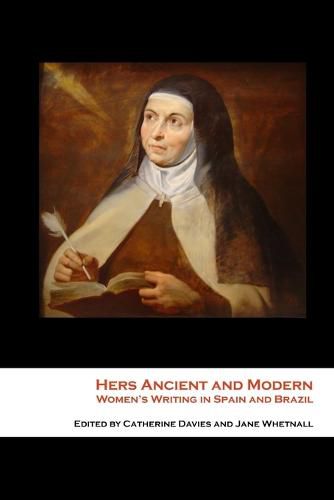Readings Newsletter
Become a Readings Member to make your shopping experience even easier.
Sign in or sign up for free!
You’re not far away from qualifying for FREE standard shipping within Australia
You’ve qualified for FREE standard shipping within Australia
The cart is loading…






Hers Ancient and Modern is a pioneering contribution to the study of women’s writing in Spain and Brazil.From medieval Spanish authors Constanza de Castilla and Teresa de Cartagena to Teresa de Avila in the sixteenth century, Maria de Zayas in the seventeenth, and Ana Maria Matute, Esther Tusquets, Carmen Martin Gaite and Cristina Fernandez in the twentieth, these essays do full justice to the long tradition of quality women’s writing in Spain. Complemented by fine studies on contemporary Spanish poet Maria Sanz and leading Brazilian authors Clarice Lispector and Lygia Fagundes Telles, as well as a survey of women novelists included in the Hispanic canon in the United States in the mid-1990s (Carmen Laforet, Martin Gaite and Matute), the book points the way to the full reinstatement of these authors and demonstrates the value of studying women’s writing across geographical and chronological boundaries.
$9.00 standard shipping within Australia
FREE standard shipping within Australia for orders over $100.00
Express & International shipping calculated at checkout
Hers Ancient and Modern is a pioneering contribution to the study of women’s writing in Spain and Brazil.From medieval Spanish authors Constanza de Castilla and Teresa de Cartagena to Teresa de Avila in the sixteenth century, Maria de Zayas in the seventeenth, and Ana Maria Matute, Esther Tusquets, Carmen Martin Gaite and Cristina Fernandez in the twentieth, these essays do full justice to the long tradition of quality women’s writing in Spain. Complemented by fine studies on contemporary Spanish poet Maria Sanz and leading Brazilian authors Clarice Lispector and Lygia Fagundes Telles, as well as a survey of women novelists included in the Hispanic canon in the United States in the mid-1990s (Carmen Laforet, Martin Gaite and Matute), the book points the way to the full reinstatement of these authors and demonstrates the value of studying women’s writing across geographical and chronological boundaries.